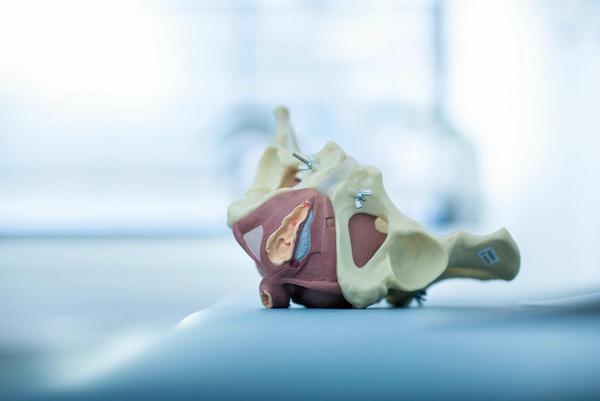Incontinence
Up to a third of all women experience problems such as urinary leakage or uterine prolapse, as a result of weak pelvic floor muscles. Our physiotherapists can help you with problems related to the pelvis, abdomen and incontinence problems.

What is incontinence?
Incontinence is a condition with involuntary leakage of urine, air or faeces. There are several types of incontinence. This can be a big problem for many and can lead to reduced quality of life, isolation and physical discomfort.
It is important to remember that despite the fact that incontinence is a common problem for many women, involuntary leakage is not natural or normal. There are treatment options for those who experience this problem. If you experience incontinence, you may want to talk to a doctor or physiotherapist to find out the cause and get advice on possible treatment options.
What is the pelvic floor?
The pelvic floor mainly consists of a large, horseshoe-shaped muscle in the abdomen and forms the floor of the pelvis. Among other things, the pelvic floor ensures that we can retain urine, air and faeces, stabilizes the core muscles and provides a supportive effect for internal organs such as the bladder, uterus and bowels.
Do you want to learn more about the pelvic floor muscles and how our physiotherapists can help you?
Read more here
Abdominal prolapse
Abdominal prolapse or prolapse is a condition where the pelvic organs (uterus, bladder or anus) sink into the pelvis. Some may also experience bulging in the vagina. This is most often due to weakened connective tissue and muscles in the pelvic floor, which causes the organs to sink down. It can be painful and distressing, and can lead to incontinence or other urinary or bowel problems. Treatment of abdominal prolapse depends on the severity and may involve physiotherapy, lifestyle changes, medication, aids and surgery.
Symptoms
- Feeling of heaviness in the abdomen
- Sensation that something bulges out through the vaginal opening
- Visible cool in the vaginal opening
- Problems with having intercourse
- Problems emptying the bladder
- Leakage of urine
- Soreness
- Problems emptying urine
- Emptying problems for stool
Treatment of incontinence
Pelvic floor training is standard treatment in Norway for urinary incontinence and abdominal prolapse. There is good documentation of the effect of pelvic floor strength training on these conditions. The pelvic floor is a muscle just like any other muscle in the body. In order for the training to have an effect, the muscles must be trained regularly over time, usually 6 months.
It is important to train the pelvic floor correctly. 30% exercise the pelvic floor incorrectly, which in the worst case can worsen the symptoms. If you are unsure whether you are doing it correctly, it is recommended to go to a qualified physiotherapist for examination and guidance.
More about pelvic floor trainingGet to know out Physiotherapists
We know that the right competence and good chemistry are important. Below you can therefore get to know our therapists better. We hope this makes it easier to find a therapist who is right for you.

Ana-Maria Stefan
Chiropractor, Majorstuen
General Chiropractic | Headache | Women's Health | Pregnancy | Prolonged pain

Heidi Prytz
Chiropractor
General Chiropractic | Back | Neck | Women's Health | Needle treatment | Headache


Lina Beate Varhaug
Chiropractor, Stavanger sentrum
General Chiropractic | Back | Neck | Women's Health | Pregnancy | Shock wave therapy | Headache | Dizziness

Ingrid-Johanne Nilsen
Chiropractor, Bergen city center
General Chiropractic | Headache | Women's health | Pregnancy

Sunniva Leilani Tvedten
Physiotherapist, Carl Berner
General Physiotherapy | Rehabilitation | Women's Health | Stress management

